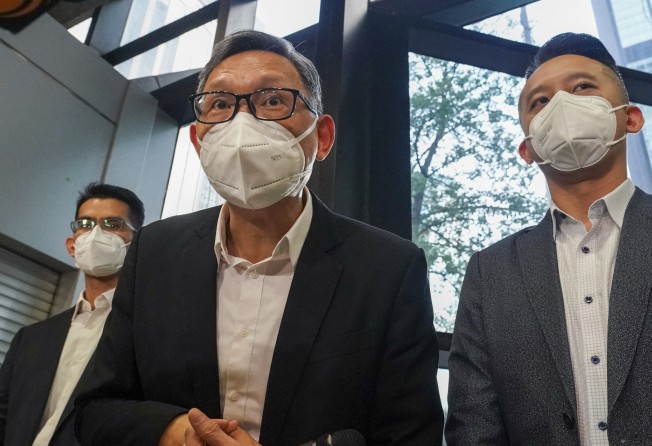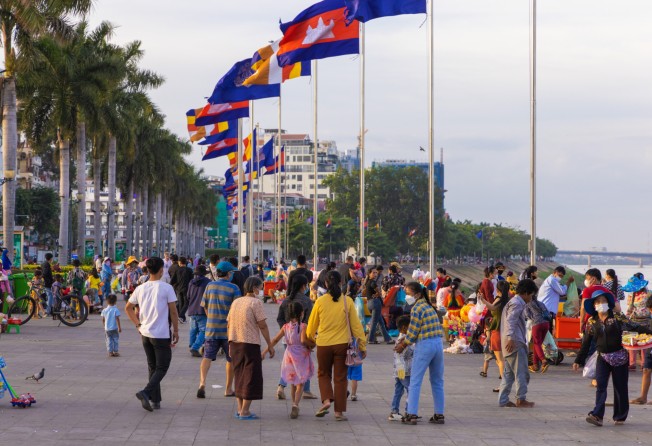
4 more Hongkongers being held captive in Southeast Asia, authorities say, refusing to rule out local links to cases
- Cases are among dozens reported so far this year involving residents held against their will overseas
- Many of the victims were conned into travelling after responding to online advertisements for jobs, senior security official says

The Security Bureau has revealed four more Hongkongers are being held captive in Southeast Asia than what was earlier disclosed, taking the number needing rescue to 12, while not ruling out that the criminals involved might have accomplices in the city.
Undersecretary for Security Michael Cheuk Hau-yip announced the new cases on Friday, a day after he said a cross-departmental task force had been set up to help coordinate rescue efforts.
“We do not rule out that the criminals have accomplices or agents in Hong Kong [assisting the syndicate], but we are very confident in the ability of our law enforcement agencies,” he said.
The government announced on Thursday the government had received 20 reports of residents conned into travelling to Southeast Asia in employment frauds or romance scams since January. Ten had returned to the city, two remained free in undisclosed locations and eight were still being held against their will in Myanmar.
Six more cases have since been reported, involving three Hongkongers being held in Cambodia and one in Thailand, while the remaining two were residents now free in the countries concerned.

Cheuk said Chinese embassies had contacted two of the residents who remained free and safe in undisclosed locations. One of them told embassy officials he did not want to go back to Hong Kong yet, and they were still arranging the return of the other resident, he said.
Many of the residents involved were conned into travelling after responding to online advertisements for jobs in casinos, sales or helping local companies to create bank accounts, the undersecretary noted.
“They were held captive after arriving there and asked to engage in online scams … If they failed or refused to deliver, they were beaten or tortured,” he said. “Some were also asked to meet specific monetary targets, and when they failed, their families were asked to send money … Some Hongkongers have yet to return after their families only paid part of the amount.”
Police would exchange information about the cases with overseas law enforcement agencies through Interpol, Cheuk added.
The Security Bureau issued an amber travel alert, the lowest in its three-tier system, for Myanmar and Thailand in 2012 and 2015 respectively, warning residents about potential threats in these countries and urging them to exercise caution if they needed to visit. No travel alerts were issued for countries such as Cambodia or Laos.
Asked whether the bureau would upgrade the alert to these countries, Cheuk said: “We will. Travel alerts are to ensure travellers’ safety. These cases are different as they involve premeditated scams, but we will still review the need for issuing travel alerts.”
Local media reports had suggested that one of the Hongkongers had managed to escape and bought tickets to fly from Bangkok to Hong Kong. But he could not board his flight because he failed to secure a quarantine place and was held captive by the syndicate again.

Cheuk said he could not comment on individual cases, but added authorities had been helping the victims fulfil quarantine arrangements. He urged residents to be alert about high-paying jobs in Southeast Asian countries.
He also said the biggest difficulty in rescuing these residents was not whether they had documents or met quarantine arrangements – it was confirming their exact location.
Cheuk said that if Hongkongers needed help while abroad, they could either call the Immigration Department’s hotline on 1868 or use the department’s smartphone app.
“If your phone doesn’t have roaming service, the app would allow you to call us using mobile data. If the data signal is too weak, or the phone call function doesn’t work, there’s also a form in the app where you can fill in some simple information … or take a picture of your whereabouts and send it to us,” he advised.
Lawmaker Elizabeth Quat, of the Democratic Alliance for the Betterment and Progress of Hong Kong, said she received a call on Thursday from the parents of a victim in his 20s who was being held captive in Myanmar. She did not mention whether this case was one of the 11 Cheuk mentioned.
“He said he would be hit by someone once every few days and saw people holding electric cattle prods and machine guns to monitor them and he could not escape … and he also saw other Hongkongers there,” she said.
Quat said she hoped the police could bring the victims back with the help of international cooperation, while fellow party member Ben Chan Han-pan said he would try to understand more about the situation, when he visited Thailand and Vietnam next month to meet business groups.
Commissioner of Police Raymond Siu Chak-yee on Friday also said residents should think twice if they were offered a good job opportunity in a foreign country.
Gina Fu, chairwoman of the Hong Kong Myanmar Manufacturers’ Association, said she had been running a garment factory near Yangon, the largest city in Myanmar, for nearly 10 years and believed that the country remained safe in general.
“According to media reports, this happened near the border between Myanmar and Thailand … After the coup last year, there were also anti-Chinese protests and some factories were attacked, but the situation now is largely stable,” she said.
The association’s vice-chairman Gary Lee Chun-fai, who runs two factories near Yangon, also said some of his senior staff had reported feeling safe.
Danny Lau Tat-pong, honorary chairman of the Small and Medium Enterprises Association, said that while many Hong Kong-owned companies in Southeast Asia were run by Hongkongers, it was rare for them to offer high salaries to newcomers via the internet.
Additional reporting by William Yiu